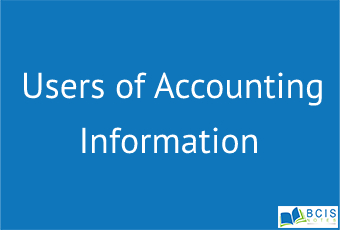
Users of Accounting Information
Accounting reports are designed to meet the common information needs of the decision-makers. These decisions include when to buy, hold or sell the shares, etc. The reports assess the ability of the enterprise to pay its employees, determine distributable profit and regulate the activities of the enterprise. Investors and lenders are the most obvious users of accounting information. The users of accounting information may broadly be classified into two groups:
- Internal Users
- External Users
Internal Users
The internal users of accounting information are different levels of management. Management needs information to review the firm’s short-term and long-term solvency. As we have known internal users work in the organization to achieve organizational goals. All internal users can be divided into different classes such as:
- Board of directions (BOD): As we know BOD is the top level of management who are elected members from the Annual General Meeting (AGM). BOD formulates different plans and policies for short-run and long-run organization goals. Without accounting information, all these functions are not possible so BOD is one of the major internal users.
- Managers: Managers are those who implement the policies and strategies set by BOD. Managers need to utilize all the economic and non-economic resources effectively. For all the managerial functions, reliable information is required and it is used.
- Accountant and others: Accountant deals with all the business activities to record and processing them. Other different persons other than accountants such as business consultants, the legal advisors also require information to use for their activities for organizational purpose.
External Users
There are various users of accounting information outside a company as mentioned below.
- Investors/Share
- Lenders
- Suppliers
- Rating Agencies and Security Analyst
- Employees and trade union
- Customers
- Government, Regulatory Agencies, and Tax Authorities
- The public
Investors/shareholders
Investors may be broadly classified as retail investors, high net worth individuals, institutional investors both domestic and foreign. As a chief provider of risk capital, investors are keen to know both the return from their investments and associated risk.
Lenders
Banks, financial institutions, and debenture holders are the main lenders or supplies of debt capital needed in business. They need information about the financial stability of the borrower enterprise. They need information about the financial stability of the borrower enterprise. They are interested in information that would enable them to determine whether their borrower has the capability to repay the loans along with the interest due on them.
Suppliers
Suppliers are those who provide physical trading and non-trading item as well as non-physical services. They also rely on the firm’s performance to make decisions related to provide the supplies on credit, the possibility of bad debts and provisions according to that or continuity of their market, etc.
Rating Agencies and Security Analyst
Investors and creditors seek accounting information in assessing prospective returns. Equity analysts, bond analysts, and credit rating agencies offer a wide range of information in the form of answering queries on television shows, providing trends in business newspapers on a particular stock, offer valuable information in seminars, discussion groups, meetings, and interviews.
Employees and Trade Union
Employees are keen to know the general health of the organization in terms of stability and profitability. Current employees have a natural interest in the financial condition of the firm as their compensation depends on the financial performance of the firm. Potential employees may use financial information to find out the future prospects of the firm.
Customers
Customers have an interest in the accounting information about the continuation of the company especially when they have established a long-term involvement with or are dependent on the company. For example; car owners, buyers of while goods and electronic gadgets depend on the manufacturer for warranty service support, continued supply of spare parts.
Government, Regulatory Agencies, and Tax Authorities
Government and regulatory agencies require information to obtain the timely and correct information to regulate the activities of the enterprise if any. They seek information when tax laws need to be amended to provide institutional support to the lagging industries. The regulatory agencies use financial reports to take action against the firm when appropriate returns are not filled in time or when the returns fail to provide the true and fair position of the business or to take appropriate action against the firm when complaints/misappropriation are being lodged.
The public
Every firm has a social responsibility. Firms depend on the local economy to meet their varied needs. They may get patronage from local government in the form of capital subsidy, cheap land, or tax sops (Concessions) in the form of tax holidays for a certain period of time.
You may also like Meaning of Accounting

Leave a Reply